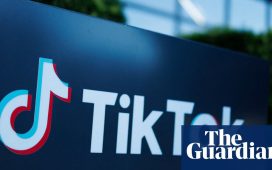Even at the tender age of five, Xu Xun knew his teachers and classmates at school in Champaign, Illinois would never be able to pronounce his name correctly.
So he decided he wanted to be called Tony, after actor Tony Danza, who at that time was starring in the hit sitcom Who’s The Boss?
“I walked with my dad to the immigration office and legally changed my name,” Mr Xu said in an interview with NPR in 2018.
Fittingly, Tony Xu, now 35, would end up being “the boss” himself. In 2013, he co-founded DoorDash, the on-demand food delivery company that on Wednesday announced it had filed for an IPO. Valued privately at approximately $13bn, its flotation is being seen as a sink-or-swim moment for the food delivery sector. Mr Xu, who is chief executive, will ride the patience of investors who have become less forgiving of lossmaking tech firms of late.
“Everybody has to watch their [cash] burn rate,” said Semil Shah, founder and general partner at Haystack, and part of DoorDash’s first funding round in September 2013. “It’s not specific to DoorDash, it’s everybody, it’s a complex business.”
He described Mr Xu as simply “very steady”, adding that “he doesn’t get too high or too low”.
Born in Nanjing, China, Mr Xu was four years old when he and his family moved to America; his father had won a place on the University of Illinois’s engineering course. The opportunity came with a cost: Mr Xu’s mother had to give up her career as a doctor and instead work in a restaurant, where Mr Xu would help wash dishes.
A tendency for frugality seems to have stuck with him in later life. According to one employee, Mr Xu refused to upgrade his 2001 Honda Accord, until it recently gave up the ghost on US-101, the main freeway that connects the cities of Silicon Valley.
When Mr Xu was 15, the family moved to San Jose, California, and he went on to study industrial engineering at UC Berkeley. Later in life, after stints at McKinsey and eBay, he took a business course at Stanford. It was here he met his co-founders, Andy Fang, Stanley Tang — both still at the company — and Evan Moore, who left in 2014.
PaloAltoDelivery.com, as it was then known, began as a service offering delivery to just eight restaurants in the area. Within 45 minutes of the website going live, Mr Xu said, they had their first order — a delivery of Thai food for an author visiting the area.
After going through the Y Combinator start-up incubator programme, where a small amount of funding is given along with mentorship, the company became DoorDash. One of its first full-time employees was Andrew Munday.
“It was 8.30pm on my first day and my girlfriend said: ‘When are you gonna be home?’,” he said. “I just said, ‘It doesn’t look like these guys are going anywhere anytime soon.’ ”
Today, current and former employees note Mr Xu’s insistence that he spend every Friday evening on a “date night” with his wife Patti, whom he met at church. They married in 2013 and have a two-year-old daughter, Olivia.
But Mr Munday described Mr Xu’s working hours as long, and his leadership style as “ruthless” — though perhaps not in the manner of other notorious disrupters in Silicon Valley.
“Ruthless doesn’t mean demeaning people or disrespecting them,” Mr Munday said. “It just means a really, really high standard . . . If you don’t know your numbers, [Tony is] going to ask you the same question five times in a row.”
Mr Xu now counts several of Silicon Valley’s most respected investors among his backers, including Alfred Lin of Sequoia Capital, who contributed to DoorDash’s Series A round in 2014, along with Keith Rabois of Founders Fund.
In March 2018, DoorDash became the latest start-up to attract the deep pockets of SoftBank’s Vision Fund, which led a $535m investment round, pushing DoorDash into the highly coveted “unicorn” valuation of more than $1bn.
In its earliest days, DoorDash’s employees — Mr Xu included — were responsible for picking up and delivering the food. The company now uses gig workers, which it calls “Dashers”, who are paid per trip, plus any tips they receive — although it wasn’t always quite as straightforward.
In July 2019, controversy hit the firm after it emerged that customer tips were being used by DoorDash to make up the difference if a Dasher did not earn the minimum amount guaranteed by the company, instead of adding it as an additional bonus, as presumably intended by the customer.
“We thought we were doing the right thing by making Dashers whole when a customer left no tip,” wrote Mr Xu on Twitter, after announcing it would change the policy.
It was a public relations mishap, and Mr Xu was said to be surprised and unsettled by the backlash. While the tipping row is behind him, other matters on pay and benefits have been less easy to set straight. And with fresh regulation swirling around the gig economy, DoorDash’s business model faces considerable risk.
If and when the company does go public, it will trigger an additional $1.5m payout to Dashers as part of a class-action lawsuit the company settled in 2017 regarding employment status. But further ahead, if the company was forced to make its Dashers employees instead of contractors — as is being sought by California’s AB5 law — it could mean the end of DoorDash, which is already, according to reports, losing $400m a year.
“It would have disastrous results if it’s implemented because it’s trying to impose an imperfect solution into a very big problem,” Mr Xu said at a conference in October.
For now, though, DoorDash is the market leader in US food delivery, though competitors of Mr Xu argue it’s a position earned via unsustainable means.
“It’s super easy to take market share when you are allowed to lose way more money per order than your competition,” said Bill Gurley, general partner at Benchmark Capital, an investor in both Uber and rival food delivery firm Grubhub, after referring to Mr Xu as “Take your tips Tony”.*
“Looks like his day of reckoning is here,” he added.
* This article has been amended from the original to remove a reference to Benchmark as a DoorDash seed investor. Benchmark co-founder Andy Rachleff made a personal investment in DoorDash.








